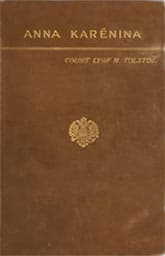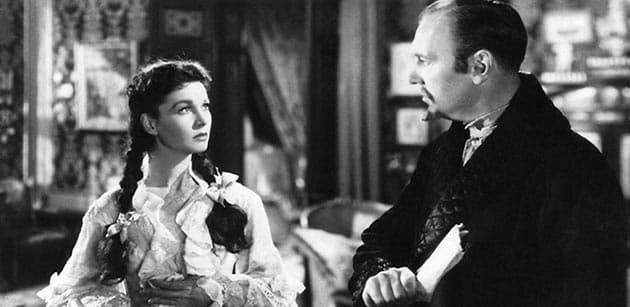Anna Karenina
Critique • Quotes • Translations • At the movies
 First English edition, 1886
First English edition, 1886First publication
1875–1877 in periodical Russkiy Vestnik (The Russian Messenger)
First book publication
1878
Literature form
Novel
Genres
Literary, romance
Writing language
Russian
Author's country
Russia
Length
Approx. 350,000 words

Karenin (Ralph Richardson) confronts his wife Anna (Vivien Leigh) in 1948 film of Anna Karenina.
The tragic love story part
Anna Karenina (1948): Film, 139 minutes; director Julien Duvivier; writers Duvivier, Jean Anouilh, Guy Morgan; featuring Vivien Leigh, Ralph Richardson, Kieron Moore, Sally Ann Howes, Martita Hunt, Niall MacGinnis, Hugh Dempster
Of course it's unrealistic to expect a gargantuan novel like Anna Karenina to fit into a movie of two hours or so without significant compromises. And the 1948 production with stars of the British stage and screen does make massive cuts to Leo Tolstoy's opus.
But the high points of the popular part, namely the course of the Anna-Vronsky love affair, are faithfully adapted. An admirer of the novel may be appalled at the film's elimination of most of the Levin-Kitty relationship, nearly all the subplots featuring other characters, and all of Levin's social and philosophical musings featured in the book.
At least the novel's famous opening scenes—the upset in the Oblonsky household—are retained but are quickly diverted into Anna's narrative. At the other end of movie, the story ends abruptly with Anna's tragic demise, bowing out before the more positive resolution of Levin's search for meaning that Tolstoy elucidates in a hundred pages to conclude his novel.
Yet the drama and dialogue of the retained parts of Anna Karenina are intelligently presented, possibly reflecting the involvement in the screenwriting by French playwright Jean Anouilh.
However, this is not enough to save the film.
Vivien Leigh, most famous as Scarlet O'Hara in Gone With the Wind, might seem a perfect choice for the lead in Anna Karenina. And she does have her admirers in the role. But for my money she never really clicks as the beautiful, passionate, but self-centred and unstable Anna. Perhaps she doesn't have enough time—and the screenwriters don't have enough pages—to develop all the nuances of her character.
Scenes from 1948 film Anna Karenina set to the "Anna Karenina Overture".
This goes double for the character of Alexei Kerenin, played by the great Ralph Richardson. His role in the film is that of the older, stern husband more concerned with his bureaucratic career than with his wife Anna's welfare. Which is an accurate portrayal as far as it goes, but we're also missing the man's better qualities such as his desire to always do what's right.
One change from the novel is significant in limiting the revelation of their characters. In the book Anna gives birth to a baby girl fathered by Vronsky. Kerenin forgives the adulterous couple and becomes close to the child, while Anna ends up treating her negligently. But in the film the baby is stillborn, thus obviating scenes showing a positive side to Kerenin and negative side to Anna.
The film's other main character Count Vronsky is the biggest disappointment. Irish actor Kieron Moore, in one of his first film roles, is terribly miscast or misdirected as the supposedly dashing lover. The camera moves in on his huge face and little romantic moustache as he moons over the sight of Anna in soft focus. They talk a lot about being madly in love. Yet the claimed passion never materializes on screen. You can more easily accept Anna's agonizing love throes when she's on her own than when he's in the scene with her.
So, not an awful film. Not even a bad film. Fine for what it aims to be: a well-produced synopsis of the tragic love story from one of Tolstoy's greatest novels.
— Eric
Critique • Quotes • Translations • At the movies

